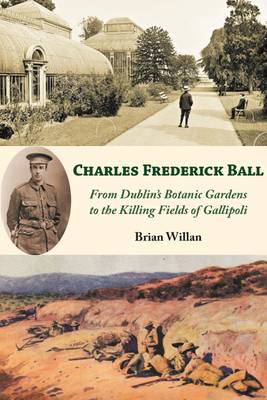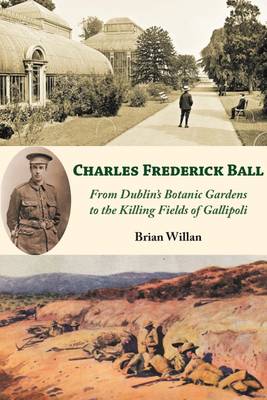
- Afhalen na 1 uur in een winkel met voorraad
- Gratis thuislevering in België vanaf € 30
- Ruim aanbod met 7 miljoen producten
- Afhalen na 1 uur in een winkel met voorraad
- Gratis thuislevering in België vanaf € 30
- Ruim aanbod met 7 miljoen producten
Zoeken
Charles Frederick Ball
From Dublin's Botanic Gardens to the Killing Fields of Gallipoli
Brian Willan
Paperback | Engels
€ 23,95
+ 47 punten
Omschrijving
When Charles Frederick Ball was killed at Gallipoli in 1915 The Irish Times called him 'one of the best known botanists and horticulturists in Ireland'. Fred Ball (to friends and family) trained in horticulture at Kew Gardens in the UK, moved to Dublin in 1906, became Assistant Keeper at the Royal Botanic Gardens in Glasnevin, and was editor of the journal Irish Gardening. A skilled plant breeder, he could have expected, in time, to succeed Sir Frederick Moore as Keeper of the Botanic Gardens. Instead, he responded to the call to serve king and country, enlisting in the famous 7th Battalion, Royal Dublin Fusiliers.
This book describes Fred Ball's life and achievements up to his tragic death at Suvla Bay in September 1915, shedding new light on his contribution to Irish horticulture as well as his time as a soldier. It is also the story of Fred Ball's relationship with Alice Lane, the youngest daughter of a well to do Anglo-Irish family, who was the love of his life. They were married in Dublin in December 1914, just after Fred had joined up.
The author, Alice's grandson, discovered among his mother's papers a small metal box containing over 100 letters that Fred wrote to Alice between 1911 and 1914. These letters, combined with further research in libraries and archives in Ireland and England, provide a captivating account of Fred Ball's life in the Victorian and Edwardian worlds of which he was a part. Richly illustrated with historical photographs, Charles Frederick Ball offers a moving testament to a life tragically cut short.
This book describes Fred Ball's life and achievements up to his tragic death at Suvla Bay in September 1915, shedding new light on his contribution to Irish horticulture as well as his time as a soldier. It is also the story of Fred Ball's relationship with Alice Lane, the youngest daughter of a well to do Anglo-Irish family, who was the love of his life. They were married in Dublin in December 1914, just after Fred had joined up.
The author, Alice's grandson, discovered among his mother's papers a small metal box containing over 100 letters that Fred wrote to Alice between 1911 and 1914. These letters, combined with further research in libraries and archives in Ireland and England, provide a captivating account of Fred Ball's life in the Victorian and Edwardian worlds of which he was a part. Richly illustrated with historical photographs, Charles Frederick Ball offers a moving testament to a life tragically cut short.
Specificaties
Betrokkenen
- Auteur(s):
- Uitgeverij:
Inhoud
- Aantal bladzijden:
- 200
- Taal:
- Engels
Eigenschappen
- Productcode (EAN):
- 9781739789206
- Verschijningsdatum:
- 20/07/2022
- Uitvoering:
- Paperback
- Formaat:
- Trade paperback (VS)
- Afmetingen:
- 156 mm x 234 mm
- Gewicht:
- 486 g

Alleen bij Standaard Boekhandel
+ 47 punten op je klantenkaart van Standaard Boekhandel
Beoordelingen
We publiceren alleen reviews die voldoen aan de voorwaarden voor reviews. Bekijk onze voorwaarden voor reviews.











